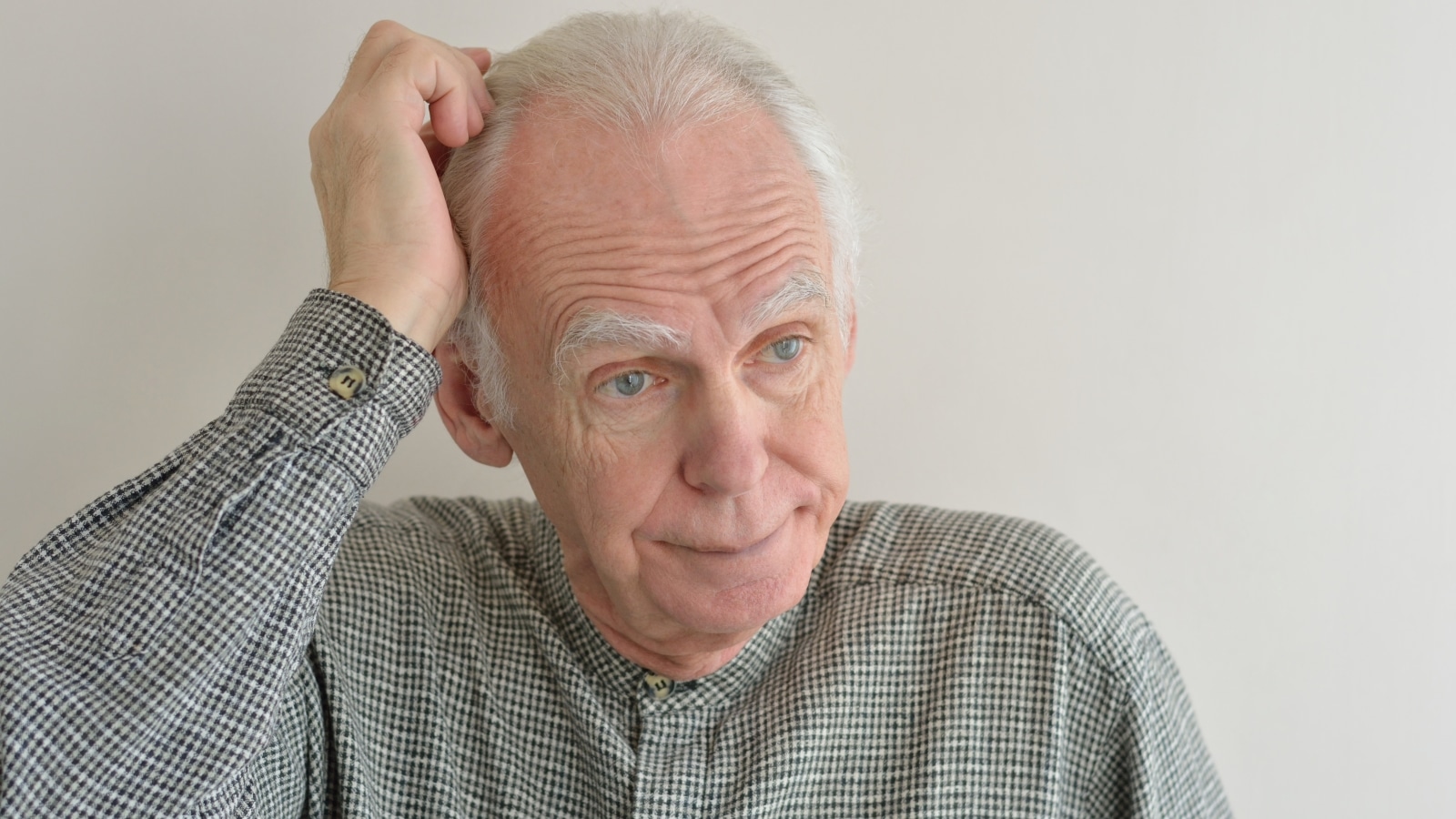We all go through aging, which comes with changes and challenges. As we age, we may face health issues and loss. Navigating these emotional and physical changes can be challenging. Let’s shine a compassionate light on these 22 aspects of growing older to better understand and comfort each other through the hidden impacts of aging.
Technology Woes

Editorial credit: Krakenimages.com / Shutterstock.
Staying abreast of the latest technology in a swiftly advancing world can feel overwhelming. One person shares the challenge of adapting to new gadgets, apps, and online platforms. The genuine concern of being left behind or becoming obsolete in a tech-driven society resonates with many older individuals. According to a Pew Research Center report, desktop computers remain popular with adults aged 35-65, with 69% of Gen X, 65% of Younger Boomers, and 64% of Older Boomers owning these devices. Conversely, millennials are more likely to own a laptop or netbook than a desktop, with 70% owning a laptop compared to 57% owning a desktop.
Empty Nest Syndrome

Editorial credit: Olena Yakobchuk / Shutterstock.
The silence of an empty nest can be deafening. One person shares the struggle of adjusting to a quieter life, void of the lively chatter of children and pets. The absence of beloved ones who have passed on adds a layer of melancholy to the solitude, making the house feel emptier than it is. According to the Pew Research Center, 63% of boomers report having at least one adult child (ages 18 and older). Among this group, about two-thirds (68%) state that they are financially supporting an adult child, serving as either the primary (33%) or secondary (35%) source of support.
Physical Changes

Editorial credit: Ruslan Huzau / Shutterstock.
Aging brings a host of physical changes, some more challenging than others. One person candidly shares the struggle of dealing with changes in sexual health. The impact of these changes on intimate relationships can be a sensitive and challenging topic to navigate. Addressing these shifts in a relationship requires understanding and communication as couples work together to adapt to the evolving dynamics of physical well-being associated with the aging process.
Coping With Limitations

Editorial credit: wertinio / Shutterstock.
Acknowledging the decline in abilities and the necessity to let go of lifelong hobbies and passions can take an emotional toll that is often left unspoken. According to a Gitnux Marketdata Report 2024, as baby boomers transitioned into middle age, many found joy in increased leisure time, dedicating themselves to hobbies like golf, tennis, and gardening. The emotional aspects of adjusting to changes in activities and interests often go undiscussed, highlighting the need for compassionate conversations around these transitions.
Independence Go Bye-Bye

Editorial credit: fizkes / Shutterstock.
The fear of becoming a burden is a common concern among older adults. One person shares their struggle with declining health and the subsequent loss of independence. The guilt associated with asking their children for help, coupled with the fear of their health deteriorating further, paints a sad picture of aging. The emotional toll of grappling with these fears highlights the complexities and challenges faced by older individuals as they navigate the intricacies of health and dependence.
Mistake Watching

Editorial credit: fizkes / Shutterstock.
The wisdom that comes with age can sometimes feel like a curse. One person shares their frustration at witnessing younger generations making the same mistakes they once made. Despite their best efforts, the warnings often fall on deaf ears, underscoring the cyclical nature of life’s lessons. This frustration highlights the challenge of imparting wisdom and life experiences as younger generations navigate their paths, occasionally encountering the same hurdles predecessors faced.
Unrecognisable

Editorial credit: fizkes / Shutterstock.
In a poignant conversation with his father, a son unveils the problematic facets of aging. Despite feeling young at heart, the father admits that the mirror reflection often appears like a stranger. The visible signs of aging sharply contrast with his enduring youthful spirit, forming a jarring disconnect that proves challenging to reconcile. This emotional insight sheds light on the complex and sometimes unsettling experiences accompanying the aging process.
Unfulfilled Dreams

Editorial credit: Lucigerma / Shutterstock.
Unfulfilled dreams can become more poignant with age. One person shares their struggle with accepting the reality of their romantic prospects. The longing for what can never be is a bittersweet part of aging. Recognizing unattainable dreams adds complexity to the emotional landscape of aging, emphasizing the enduring impact of unfulfilled aspirations on one’s sense of contentment and fulfillment.
Fearing Memory Loss

Editorial credit: Giulio_Fornasar / Shutterstock.
With aging, the looming fear of memory decline or conditions like Alzheimer’s becomes more tangible. One person expresses anxiety about forgetting names, misplacing items, or struggling with familiar tasks, questioning if these are early signs of a more significant issue. According to the National Library of Medicine, an estimated 6.7 million Americans age 65 and older are currently living with Alzheimer’s dementia. This number could reach 13.8 million by 2060, pending medical breakthroughs to prevent, slow, or cure AD.
A Generational Gap

Editorial credit: VGstockstudio / Shutterstock.
Navigating the growing gap between older generations and emerging youth culture presents various challenges, encompassing communication barriers and cultural differences. The task involves understanding and addressing the contrasts in experiences and perspectives that arise as societal norms evolve. Finding common ground becomes essential in bridging these intergenerational divides and fostering mutual respect and understanding between the diverse age groups that comprise our changing societal landscape.
Retirement Planning

Editorial credit: Miljan Zivkovic / Shutterstock.
Financial stress related to retirement planning is a common struggle with getting older. As individuals approach retirement age, the complexities of financial planning become more pronounced. The need to secure a comfortable and stable financial future adds a layer of stress to the aging process. This financial strain underscores the importance of early and thoughtful retirement planning to alleviate the challenges of managing one’s finances later in life.
The Irrelevance Fear

Editorial credit: PeopleImages.com – Yuri A / Shutterstock.
In the face of the world’s rapid transformations, numerous older individuals harbor concerns about their ability to keep pace, particularly regarding technology, pop culture, and social trends. This apprehension can give rise to feelings of isolation and the problematic belief that their experiences and knowledge might no longer hold value or be sought after by younger generations. The evolving landscape may trigger anxieties about relevance, emphasizing the need for a more inclusive and appreciative societal outlook toward the insights and wisdom of the older demographic.
Lost in an Ever-Changing World

Editorial credit: Bankiras / Shutterstock.
The world can seem increasingly strange and irrational as one age. One person talks about feeling left behind as the world around them changes in ways they find hard to understand. This sense of detachment underscores the challenges of navigating a rapidly evolving society, where the pace of change may outstrip one’s ability to fully comprehend or adapt, resulting in a palpable sense of disconnection and bewilderment in the face of unfamiliar norms and trends.
Bathroom Issues

Editorial credit: Andrew Angelov / Shutterstock.
Aging can bring about unexpected and often inconvenient changes. One person shares their experience with having less control over their bladder. The embarrassment and inconvenience of such situations are a stark reminder of the physical challenges that come with aging. These candid revelations shed light on the practical difficulties individuals face as they navigate the unanticipated aspects of the aging process, emphasizing the need for understanding and empathy in addressing these physical changes.
Struggle to Rebuild Social Circles

Editorial credit: pikselstock / Shutterstock.
With time, individuals may lose close friends or family members. Moreover, retirement often translates to reduced daily interaction with colleagues. Consequently, a sense of loneliness may ensue, accompanied by the formidable challenge of establishing new social connections later in life. This task becomes particularly daunting in a world where numerous social interactions have migrated to online platforms, highlighting the complexities of fostering meaningful connections in an evolving social landscape.
Pain of Activity

Editorial credit: Perfect Wave / Shutterstock.
The joy of physical activity can be marred by the pain that comes with age. One individual shares their realization that the decline in physical activities among older people is not due to inability but rather the discomfort and pain that often accompanies them. Managing and overcoming this physical discomfort becomes a key consideration for more senior individuals seeking to maintain an active lifestyle, highlighting the need for adapted and pain-free forms of exercise.
Healthcare Costs

Editorial credit: Michail Petrov / Shutterstock.
With age comes increased medical needs and higher healthcare costs. The AARP reports that the average retired couple will spend nearly $280,000 on healthcare during retirement. These escalating healthcare expenses pose a significant financial challenge for older individuals and retirees, necessitating careful financial planning to ensure adequate coverage and support. The financial burden associated with healthcare in the later stages of life emphasizes the importance of proactive measures to navigate the complexities of healthcare costs during retirement.
Energy Level Loss

Editorial credit: fizkes / Shutterstock.
The vitality of youth gradually gives way to the slower pace of old age. One individual talks about the noticeable drop in energy levels after turning 60. The need for more rest and the slower pace of life can be a difficult adjustment. Embracing a lifestyle with increased rest requirements becomes an essential aspect of adapting to the changing rhythms accompanying the aging process, marking a shift from the energetic pace of youth to a more measured and deliberate approach to daily life.
The Surprise of Weight Gain

Editorial credit: JPC-PROD / Shutterstock.
The battle with the bulk can become more complicated with age. One person shares their struggle with unexpected weight gain. Despite not being a big eater, they found it increasingly difficult to lose weight, highlighting the changes in metabolism that come with aging. Coping with these shifts in metabolism requires a nuanced approach to diet and exercise as individuals navigate the complexities of maintaining a healthy weight amid the challenges posed by aging and changing bodily functions.
Aging Parents

Editorial credit: Ground Picture / Shutterstock.
Caring for aging parents is another overlooked struggle. Ensuring they’re safe and looked after can take a physical and mental toll. The responsibility of ensuring the well-being of aging parents becomes a significant aspect of the aging process for many individuals. The challenges of balancing one’s life with caregiving responsibilities contribute to the overall complexities associated with aging, underscoring the need for support systems and resources to navigate these demanding and often emotionally taxing situations.
The End of Long-Term Relationships

Editorial credit: Roman Chazov / Shutterstock.
Ending a long-term relationship can be a significant challenge as one ages. One person shares the pain of losing a spouse to divorce or death after 25 years or more of marriage. The loss of a partner, especially after so many years, can be a devastating part of the aging process. Coping with the emotional aftermath becomes a profound aspect of the senior journey, highlighting the complexities of adapting to life’s transitions, especially in personal relationships.
Pure Loneliness

Editorial credit: fizkes / Shutterstock.
Aging can be a lonely journey. As friends pass away and making new connections becomes more challenging, the prospect of spending the rest of one’s life alone becomes increasingly accurate. This confession underscores the importance of companionship and social connections at every stage of life. Acknowledging this aspect emphasizes the significant role that relationships and meaningful connections play in alleviating the isolation accompanying the aging process.
“No Boomers Allowed”: 15 States Where Retirees Are NOT Welcome

Image Credit: Rapideye via Canva.com
If you’re planning a significant change during retirement, it’s crucial to think about the kind of home you desire and the aspects you should steer clear of. “If you’re thinking about making a big move in retirement, it’s important to consider what characteristics you want in your new home and which ones to avoid at all costs,” suggests experts. To assist you, we’ve compiled a catalog of the 15 least favorable states for retirement.
“No Boomers Allowed”: 15 States Where Retirees Are NOT Welcome
16 UNACCEPTABLE THINGS BOOMERS GOT AWAY WITH IN THEIR YOUTH THAT WOULD SPARK OUTRAGE TODAY

Image Credit: DepositPhotos.
Looking back on the childhood of the boomer generation, it becomes evident that certain things once considered appropriate would never pass today’s standards. The cultural landscape has evolved significantly, leading us to recognize 16 aspects of their upbringing that would be deemed wholly unacceptable today. From unsupervised outdoor adventures to unfiltered television content, the boomer generation got away with various experiences that would undoubtedly raise eyebrows in today’s world. Let’s delve into these intriguing elements of their upbringing and reflect on how far society has come.
16 UNACCEPTABLE THINGS BOOMERS GOT AWAY WITH IN THEIR YOUTH THAT WOULD SPARK OUTRAGE TODAY
STUCK IN THE 60S: 10 THINGS BABY BOOMERS REFUSE TO LET GO OF

Image Credit: RapidEye via Canva.com
Memories of the “good old days” keep us trapped in the past. Baby boomers love to retell tales of how it was “in my day.” At the same time, millennials will tell them to get with the times. Being stuck in a time warp from which they don’t want to snap out of, here are things that baby boomers still think are fantastic. STUCK IN THE 60S: 10 THINGS BABY BOOMERS REFUSE TO LET GO OF
IT’S TIME TO LET GO: 30 OUTDATED BOOMER HOME TRENDS THAT DESPERATELY NEED TO BE SHOWN THE EXIT!

Image Credit: Shutterstock.
With the advances of social media, home trends, décor, and fads change faster than ever before. While some trends become instant classics, others can be redundant, unsensible, or just downright hideous. In a popular online forum, users shared the home fads they’re tired of seeing. We’ve compiled a list of these most disliked home décor fads, so grab a cup of coffee, and let’s look into these less-than-inspiring home design options!
IT’S TIME TO LET GO: 30 OUTDATED BOOMER HOME TRENDS THAT DESPERATELY NEED TO BE SHOWN THE EXIT!



